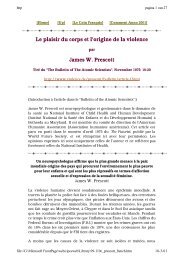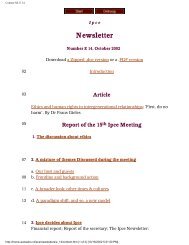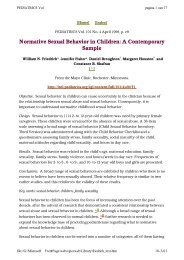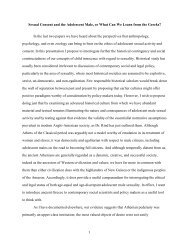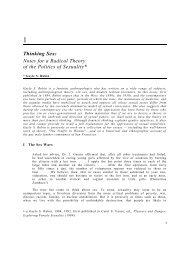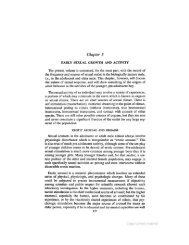Infant and Child Sexuality: A Sociological Perspective - Ipce
Infant and Child Sexuality: A Sociological Perspective - Ipce
Infant and Child Sexuality: A Sociological Perspective - Ipce
You also want an ePaper? Increase the reach of your titles
YUMPU automatically turns print PDFs into web optimized ePapers that Google loves.
Tom <strong>and</strong> I became the best of friends in fourth<br />
grade. Throughout our grade school years we were<br />
virtually inseparable. Ours was a typical<br />
childhood relationship, one between two people<br />
who, by chance, happened to be of the opposite<br />
sex.<br />
Our parents thought that everything was cute <strong>and</strong><br />
perfectly harmless. Actually from my st<strong>and</strong>point,<br />
all was quite harmless.<br />
But, according to sociologists, if there is an innate period it can<br />
be modified, for the notion of an innate predetermined psychological<br />
sexuality does not correspond with existing evidence. According to a<br />
social theory of sexual development, the individual begins life with a<br />
biological capacity for sexual maturity <strong>and</strong> a psychosexual plasticity<br />
capable of developing along a variety of lines depending upon the definition<br />
of social roles in his particular culture <strong>and</strong> community as well<br />
as upon his unique learning, especially during the formative periods of<br />
life. (Brown <strong>and</strong> Lynn, May 1966).<br />
Rather than passing through a set series of sexual stages determined<br />
by physical growth, children develop at different rates <strong>and</strong> in a<br />
wide variety of directions depending upon how they are raised. In some<br />
communities they may go through the classic series of stages in attitude<br />
toward the opposite sex; pre-school friendships, elementary school<br />
dislikes, followed by junior high school awakening <strong>and</strong> high school attraction<br />
<strong>and</strong> involvement. In other communities, perhaps only a few<br />
miles away, the series of stages may be quite different. Broderick<br />
found communities in the United States in which there were well-established<br />
romances going on in the kindergarten class <strong>and</strong> a great deal of<br />
giggling <strong>and</strong> gossiping over couples. Among these five year olds, whois-going-to-marry-whom<br />
was a common subject of conversation. By eight<br />
<strong>and</strong> nine years of age children played kissing games at their parties.<br />
By ages ten <strong>and</strong> eleven nearly half had begun to date <strong>and</strong> most had a series<br />
of crushes on adults <strong>and</strong> other children. Ninety per cent of the<br />
fifth grade boys in one community were involved in what Broderick referred<br />
to as “special” relationships with girlfriends. In another community<br />
the crowning social event of the year was the class dance, a<br />
“date” affair in which a Queen <strong>and</strong> King of the fifth grade were chosen.<br />
(Broderick, 1966).<br />
Anthropologists have complained for years that both the hormone <strong>and</strong><br />
the psychoanalytic theories failed to account for the sexual activities<br />
of young children in certain primitive societies. United States<br />
data has shown that romantic interest in the opposite sex begin in infancy<br />
or early childhood, depending on the degree of permissiveness <strong>and</strong><br />
stimulation in the social environment. This is not to deny the marked<br />
impact of puberty upon sexual attitudes <strong>and</strong> experiences.<br />
Psychoanalytic theory of sexual development has had more emphasis<br />
in the human sexuality literature than it deserves, particularly in the<br />
literature on infant <strong>and</strong> child sexuality. This is so, first of all, be-<br />
3



